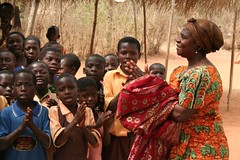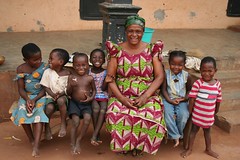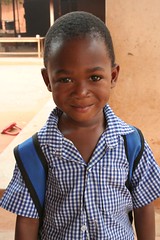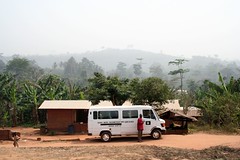AIDS IN AFRICA

Social vaccine holds promise for AIDS crisis
By Greg Harris
When Princess Diana changed our attitudes about AIDS in 1987 by shaking hands with a man dying of the disease, the world knew little about the concept of a social vaccine. Now, thanks to the work of a University of Calgary political scientist, the same idea is producing positive results in the African nation of Ghana and holds promise for reducing infection rates around the world.
Dr. Donald Ray, who is studying how traditional African leaders can foster behavioural changes and reduce the spread of HIV/AIDS, says the social vaccine concept, developed in Ghana, provides a ray of hope this World AIDS Day (December 1) in what is otherwise a bleak picture.
“ When Princess Diana showed compassion toward that man dying of AIDS, she was, in effect, a traditional leader working outside of the established political structure,” Ray says. “And because she wasn’t a politician or a scientist, people sat up and noticed. In Ghana, where the chiefs, queen- mothers and other traditional authority figures are working to slow the progression of HIV/AIDS, the same idea is proving extremely effective.”
 Although Ray’s research doesn’t yet provide conclusive evidence, early results are compelling. For example,
Although Ray’s research doesn’t yet provide conclusive evidence, early results are compelling. For example,
in the case of Ghana, for those who are aged 15-49, about five people out of every
100 are HIV positive. In South Africa, about 25 per cent of this population is infected, and in Botswana, it’s 38 out of 100. In Calgary, by comparison, fewer than one per cent are HIV-positive.
“The whole idea of the social vaccine concept is that – while we await the medical vaccine – we work toward finding other solutions and easing the suffering,” Ray says.
In Ghana, both chiefs and queenmothers are speaking on the issue to their people, raising funds to support AIDS orphans, taking part in public education campaigns, and even participating in long-distance running events to raise money. “Traditional African leaders have a special kind of credibility in their communities, based on the fact that their offices go back to the pre-colonial period,” Ray says. He adds that aboriginal communities in Canada are beginning to explore the same ideas involving traditional leaders.
Worldwide, some five million people became HIV positive in 2003. Because of the concentration of cases in Africa, there is a very real danger that communities and even states may collapse, potentially plunging the region into a deadly cycle of warlordism and civil war. Nelson Mandela has publicly endorsed the social vaccine concept, saying he thinks Africa’s traditional leaders need to become more involved in the fight against HIV/AIDS.
Ray established and heads up the U of C-based Traditional Authority Applied Research Network (TAARN) and is using funding from the International Development Research Centre of Canada to study Ghana’s social vaccine concept in action. A number of his graduate students have visited the country in connection with the research, including Sherri Brown and Kimberly Schoon, who have both been made honorary Queenmothers.
“The Queenmothers are a wonderful group of women who unquestioningly embraced me and welcomed me into their homes and communities,” Brown says. “They have done so much with so little, mobilizing themselves and their communities to courageously and successfully fight back.”
"I found a group of determined women who confronted the epidemic with strength and courage."
By Sherri Brown
![]() n July 2004, I departed for Ghana, West Africa to conduct fieldwork research on the role of a group of female traditional leaders (Queenmothers) in HIV/AIDS programming in the Manya Krobo district in the Eastern region, an area of high HIV prevalence. The research project, the Traditional Authority Applied Research Network (TAARN), led by professor Don Ray of the Department of Political Science and funded by the International Development Research Centre (IDRC), had discovered their work during previous visits to Ghana, and I was charged with the task of exploring their work in greater detail.
n July 2004, I departed for Ghana, West Africa to conduct fieldwork research on the role of a group of female traditional leaders (Queenmothers) in HIV/AIDS programming in the Manya Krobo district in the Eastern region, an area of high HIV prevalence. The research project, the Traditional Authority Applied Research Network (TAARN), led by professor Don Ray of the Department of Political Science and funded by the International Development Research Centre (IDRC), had discovered their work during previous visits to Ghana, and I was charged with the task of exploring their work in greater detail.
 I travelled to Odumase, the capital of the Manya Krobo district, to live with the Queenmothers there and to observe their work in HIV/AIDS prevention and support programming. Ultimately, what I found was a group of determined women who, despite the challenges of poverty, illiteracy and stigma, empowered themselves and their communities to confront the epidemic with strength and courage.
I travelled to Odumase, the capital of the Manya Krobo district, to live with the Queenmothers there and to observe their work in HIV/AIDS prevention and support programming. Ultimately, what I found was a group of determined women who, despite the challenges of poverty, illiteracy and stigma, empowered themselves and their communities to confront the epidemic with strength and courage.
In 1998, after witnessing countless families struggle with HIV/AIDS, the Queenmothers formed an association and sought guidance and support from the Ministry of Health and Family Health International, a non-governmental association on how to address issues of HIV/AIDS. The ministry provided extensive HIV/AIDS, sexual and reproductive health education and training for over 170 Queenmothers. Today, the Queenmothers have implemented widespread HIV prevention.
programming, including condom education and provision, home and community education, and HIV prevention training for local health and service providers.
As part of their traditional duties, Queenmothers are responsible for the welfare of families in the communities they control. During home visits, they identified over 1,000 AIDS orphans. The Queenmothers worked to secure food supports for these children as well as funds for their school fees, books and uniforms. Ongoing fundraising efforts are needed to care for these children and to provide them with resources for higher education. The Queenmothers have openly acknowledged and addressed issues of HIV/AIDS in their communities and worked to promote behavioural change, including condom use and de-stigmatization. They have developed partnerships with NGOs, governments, and universities, including the University of Calgary.
As a gesture of this partnership, a partnership recognized as akin to a family, the Queenmothers installed me as an honorary Queenmother.
Gathered in their resource centre, the Queenmothers - adorned in the blue and white association cloth - presented me with a dress made from the same fabric. During the ceremony, I was given gifts of Krobo beaded necklaces, bracelets, and earrings. Djase, a Queenmother, tied on a bracelet that had three beads on braided twine rope. The blue bead represented vitality; hope for a healthy and successful life. The black bead represented death; a reminder that life is finite and we must do the best we can in the time we have. The ivory bead represented life or the after-life. Serving as a stark reminder of the hardships of life there, Krobo babies are not named or presented with the bracelet until they have survived to their eighth day. I was named ‘Mateko’, meaning ‘daughter of the Royal Paramount home’ and installed as ‘Seyelor Mateko’, meaning ‘Honorary Deputy Queenmother.’ Happy chaos followed with photo taking and traditional song and dance.
The Queenmothers are a wonderful group of women, who unquestioningly embraced me into their homes and communities. They have done so much with so little, and serve as both a model and a plea. They serve as a model because in the devastating age of HIV/AIDS and poverty in their communities, they mobilized themselves and their communities to courageously and successfully fight back.



